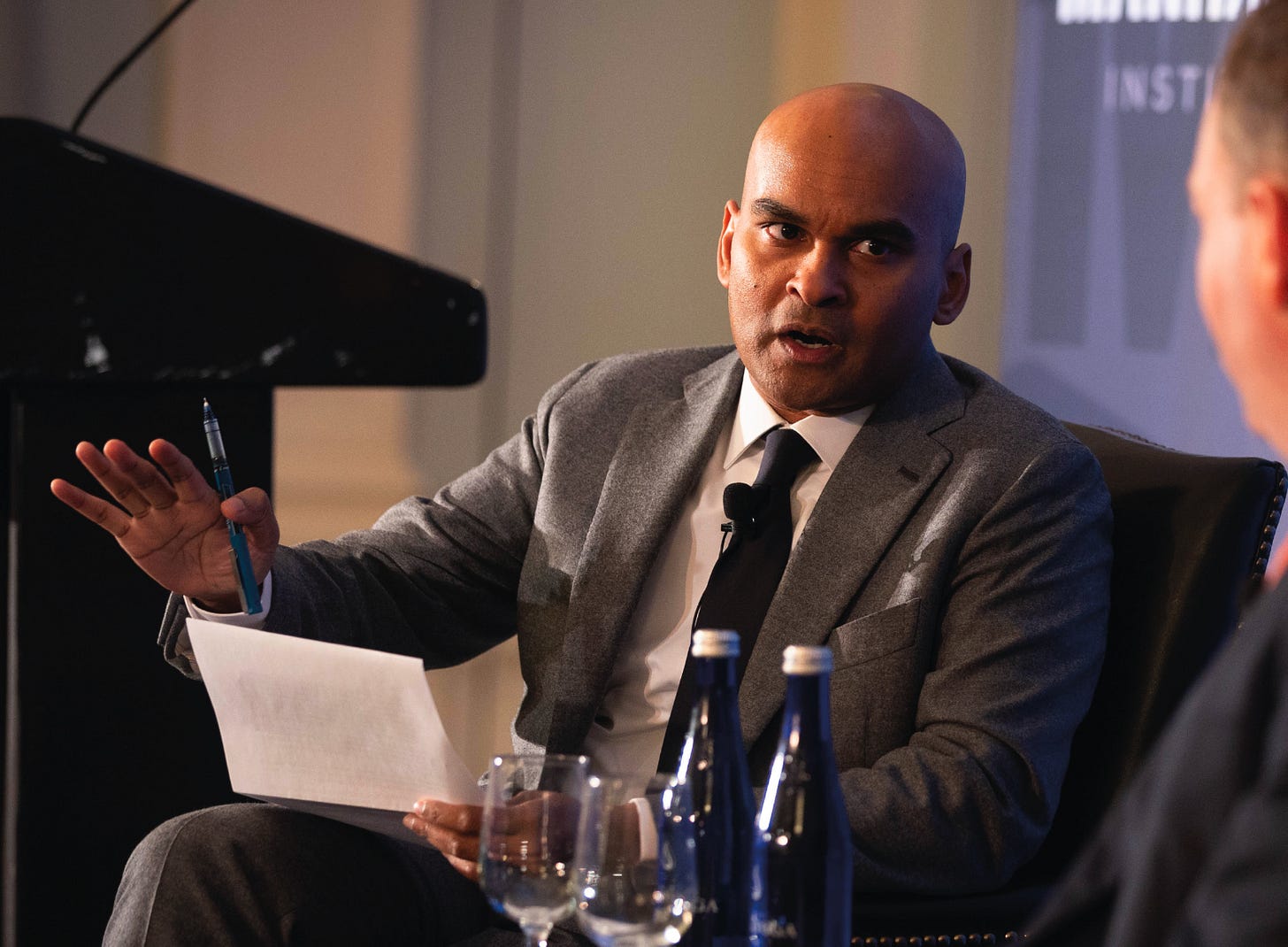Professor Emeritus Harvey Mansfield and Reihan Salam Discuss the “War on Success”
Contributed by Richard Y. Rodgers
On April 4, the Program on Constitutional Government hosted Reihan Salam ‘04, president of the Manhattan Institute, for a talk about the “War on Success” moderated by Professor Emeritus Harvey Mansfield ‘61. The talk explored themes of economic mobility, privilege, and the cultural implications of wealth. Salam, also known for co-authoring the book Grand New Party with Ross Douthat ‘02, reflected on past articles he had written concerning what he termed “opportunity hoarding.” He argued that, in particular, the upper-middle-income class, despite espousing liberal politics, had effectively created exclusive networks that maintained their social, political, and economic dominance.
Salam’s talk reflected on a New York Magazine article that explored how many “creative professionals” in New York City rely on familial financial support to sustain their decadent lifestyles. This phenomenon—of having one’s entire life subsidized by parents or grandparents well into adulthood—which he referred to as the “intergenerational transmission of advantage,” was historically (at least among those of means) an accepted norm but has more recently been scrutinized as a form of unfair privilege. These hangers-on, he noted, feel “ashamed” by this lifestyle, even if they have misgivings about admitting it publicly and would never disavow the support. He traced the shift in perception to sociology literature from the 1960s and 1970s, noting that it gained mainstream attention after the 2008 financial crisis—there was once a time when this sort of familial patronage was an assumed benefit of generational success, that this outlook changed gradually in the latter half of the 20th century.
Beyond financial inheritance, Salam emphasized that this transmission of advantage extends to values, networks, and ideas. He suggested that wealth attainment should not be feared or disparaged but should instead be integrated into a broader cultural mission of fostering resilient communities. This integration is a part of what Salam called “islands of stability,” wherein communities and subcommunities maintain such a robust and thoroughly integration network that to betray this comes at great personal cost to the individual. The result: flourishing communities where people have loyalties and are thoroughly bought into the wellbeing of the herd.
Salam also expressed concern about the future of conservatism. He argued that conservatives should focus more than they currently do on living lives of “vigorous virtues”, cultivating strong family and community networks to uphold stability and cultural continuity.
He then framed his points against the backdrop of modern-day Harvard. He suggested that people increasingly come to Harvard not because it has an animating vision but because it’s safe, universally legible, and uncontroversial. The school no longer cultivates a coherent tradition or intellectual temperament so much as it confers an imprimatur. It has joined the long march toward what Salam called “institutional isomorphism”—indistinguishable from her peers in what she values, whom she admits, and what she rewards. This sameness may appear inclusive on its face, but it comes at the expense of institutional character.
The irony, of course, is that Harvard remains deeply exclusive, but now must ritualistically disavow its exclusivity. Salam recounted a story of a former dean who once insisted that Harvard has “always been opposed to these forms of exclusion”—a carefully hedged phrase that, however well-intended, reveals more than it conceals. For Salam, the problem is not that Harvard excludes, but that it no longer knows why it excludes or what, exactly, it is preserving. The old differences between schools—Princeton’s “spikiness,” for instance—have been flattened in the name of equity, but with that flattening has come a loss of “stickiness,” of the kind of enduring identity that requires years of formation and generates meaning. If Harvard is to remain more than a professional pipeline or a symbol of managed success, it must risk becoming spiky again.
Ultimately, Salam described his vision as one of “constructive conspiracy,” where families and communities intentionally cultivate their own cultural and economic strength to withstand external pressures. This isn’t a conspiracy in the pejorative sense, but rather a quiet, purposeful coordination—a commitment among like-minded individuals to form dense networks of mutual support, shared values, and long-term investment. It’s a call to work in concert for the betterment of one's subcommunity, to build institutions and habits of solidarity that are resilient against the flattening forces of mass cultural decline. In an era of growing distrust and social fragmentation, he argued that this approach offers a more viable, prosperous path forward.




I would be interested to know the definition of privilege being applied here. Many times people loosely use the term “ white privilege” without explaining the meaning. I think that matters to give better context.
Fascinating thesis! I agree with his assertion that conservatives need to promote and build strong, virtue-based communities. I did find myself wondering whether Salam sees these communities based on tribal identity or "race," or whether he envisions communities and institutions that are blind to immutable characteristics, ethnos, or sectarian religion? The last may be inevitable and perhaps even good since it binds a community with a shared definition of God's expectations. The trick of course is ensuring the spikey, sticky entities we create live in tolerance with each other.